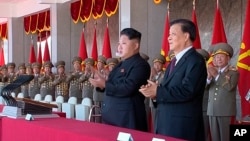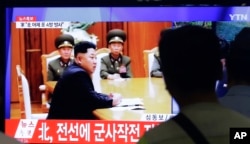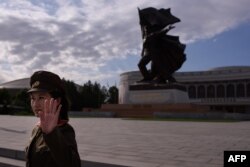North Korea Sunday rejected resuming international talks to end its nuclear program and instead called upon the United States to negotiate a formal peace treaty.
The call for a peace treaty was part of a North Korean Foreign Ministry response to comments made by President Barack Obama and South Korean President Park Geun-Hye Friday in Washington, where they said they were ready to engage with Pyongyang if the country agreed to give up its nuclear weapons.
In a statement published by the North’s state controlled Korea Central News Agency and read in part on state-run television KRT, the North’s foreign ministry said past efforts to focus exclusively on international denuclearization talks failed.
South Korea on Monday dismissed North Korea’s demand for a peace treaty with the United States.
South Korean Foreign Minister Yun Byung-se told lawmakers the 2005 Joint Statement of the Six-Party Talks calls for a peace treaty to be made after the denuclearization of North Korea, in reference to a deal in which Pyongyang agreed dismantle its nuclear weapons program in exchange for economic aid, security guarantees and improved diplomatic ties.
2005 agreement
North Korea agreed to dismantle its nuclear weapons program in exchange for economic aid, security guarantees and improved diplomatic ties under a 2005 joint agreement made by the six regional parties participating, North Korea, South Korea, the United States, China, Russia and Japan.
But Pyongyang failed to live up to its commitment and conducted nuclear tests in 2006, 2009 and 2013, all of which undermined the deal and resulted in U.N. imposed sanctions on North Korea.
Continuing tensions
From Pyongyang’s perspective it has been the U.S.’s hostile polices and provocations, including its large-scale joint military exercises on the Korean peninsula, that have “chilled the atmosphere” and increased regional tensions.
In the Foreign Ministry statement Pyongyang said the best way forward is for Washington to negotiate a peace treaty to replace the 1953 armistice that ended hostiles.
North and South Korea remain technically at war under the truce signed in 1953 with the United States, which had led U.N. forces backing the South, and China, which fought for the North.
A peace treaty, Pyongyang said, could reduce tensions and build confidence to make it possible to “finally put an end to the nuclear arms race.”
The foreign ministry statement also made it clear that continuing to increase diplomatic pressure and sanctions will not bring North Korea to the negotiating table.
"If the United States insists on taking a different path, the Korean peninsula will only see our unlimited nuclear deterrent being strengthened further," said the October 18 foreign ministry statement.
Peace a first step?
Chung-in Moon, a political science professor with Yonsei University, has long been a vocal advocate for a peace treaty to be negotiated with North Korea.
“North Korea will never give up its nuclear weapons unless their security concerns are addressed and the best way of addressing North Korea’s security concern is to have some sort of talks regarding the creation of a peace regime on the Korean peninsula,” Moon said.
Moon said now is the time to try a new engagement strategy, given Pyongyang’s recent cooperative behavior in hosting family reunions this week and its decision to hold off on its threat to launch a long-range rocket.
“North Korea has shown its retraining behavior and therefore it will be very useful if the United States can come up with some kind of targeted reinforcement on North Korea,” Moon said.
Of course negotiating a peace treaty would be extremely complicated given that both South and North Korea still technically lay claim to the entire Korean peninsula.
Pyongyang in its statement calls upon Washington to negotiate a peace treaty but does not mention involving Seoul or Beijing, the two other parties that signed the 1953 armistice.
And skeptics say a peace treaty might undermine the Seoul/Washington alliance, and put pressure on the U.S. to reduce its military presence in South Korea while rewarding Pyongyang with improved diplomatic ties without reducing the North Korean nuclear threat.
A peace treaty that legitimizes the separation of the two Koreas would also run counter to South Korean President Park’s calls for peaceful unification as the "the fundamental solution" to resolve the nuclear dispute and bring lasting peace to the Korean peninsula.
Youmi Kim and Kim Hwan Yong in Seoul contributed to this report.







